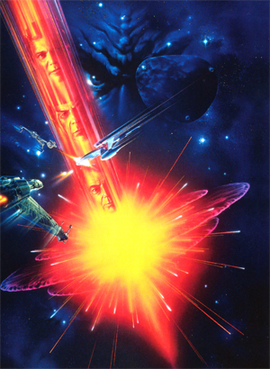Star Trek VI: The Franchise Recovery Mission
 - After the film farce of 1986 and film flop of 1989, the Star Trek film series returns with a dramatic direction in 1991 with Star Trek VI: The Undiscovered Country - and what a welcomed return it is. Returning The Wrath of Khan (1982) director, Nicholas Meyer, to the Star Trek director's chair, The Undiscovered Country is a good Sci-Fi film and a great end for the original Enterprise crew.
- After the film farce of 1986 and film flop of 1989, the Star Trek film series returns with a dramatic direction in 1991 with Star Trek VI: The Undiscovered Country - and what a welcomed return it is. Returning The Wrath of Khan (1982) director, Nicholas Meyer, to the Star Trek director's chair, The Undiscovered Country is a good Sci-Fi film and a great end for the original Enterprise crew.Since the previous Star Trek film, Star Trek V: The Final Frontier (1989), was a critical and box-office failure, The Undiscovered Country pretends that it never existed, creating a stand-alone story and drawing small references from other films of the series instead. Mirroring the actual 20th Century peace (well.... sort of) between the Western Nations and the former Soviet Union, The Undiscovered Country builds its story around a possible peace between the Federation and Klingon Empire. After an accident on the Klingon moon, Praxis, the Klingon home world becomes affected to perilous levels (Chernobyl, anyone?). Unable to come out of the situation alive without help, the Klingons turn to peace with the Federation. To not appear in a weak position, the Federation sends their best and most feared man, Captain Kirk, to escort the Klingon Ambassador to Earth for the historic peace talks. There is a problem however: Kirk still has a chip on his shoulder because Klingons killed his son and he flat-out does not trust the entire race.
But nothing goes according to plan anyway, as a bunch of Klingons get assassinated before the peace talks can occur. Now the opportunity for peace becomes very thin as Kirk and McCoy are named as the Klingon killers (oh yeah, and then there is the fact that Kirk's and McCoy's lives are at stake). In standard Enterprise fashion, the crew plays games with galactic leaders in their search for the truth and the evidence to save Kirk and McCoy. Unique to the other films of the Star Trek series, a futuristic "whodunit" develops. This detective-like aspect is great and adds mystery and of course entertainment to the film.
The original cast leaves the Star Trek film series in quality and style, giving real good performances all around. Nimoy is at a Spock-best not seen since The Wrath of Khan, DeForest Kelley is great as McCoy with both the dramatic and humorous aspects of the character (as usual), and William Shatner recovers from his Star Trek dry spell of the previous film and delivers a fine leading performance. Walter Koenig is even good! What a surprise! He is actually not annoying at all! Christopher Plummer is also fantastic as Klingon General Chang, giving a performance that ranks among the best of the Star Trek villains. It is now proved that there is no character that Plummer cannot portray. Plummer is a great villain and a great Klingon - he even recites Shakespeare; and, at times, in Klingon no less! Come on!
Star Trek VI: The Undiscovered Country opened in December of 1991, over a month after Star Trek creator Gene Roddenberry passed away, and the words "For Gene Roddenberry" appear at the beginning of the film. With all of the good screen writing, performances, and atmosphere, The Undiscovered Country becomes not only a nice addition to the Star Trek film series but a great tribute to Gene Roddenberry as well.
CBC Rating: 7/10




